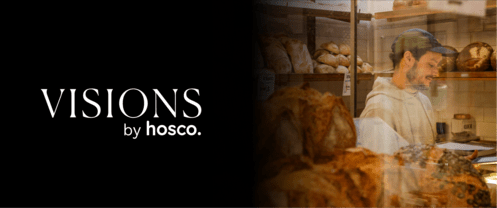The second episode of Visions by Hosco brought us to Pa de Kilo, a bakery located in the heart of Barcelona, famous for its high-quality bread.
One of the phrases that stuck with us after doing this interview, was when Oswaldo Brito, co-founder of Pa de Kilo, told us what he believes to be the key to success:
"I think the key to success is to always be transparent," he said, "to be transparent in the process and with the customers, and for people to get to know you without having to hide anything. Many customers who come to our shop crane their necks to look and see what is going on in the back, in the workshop, and when this happens we invite them in, 'we are here making bread', we tell them, 'come in and have a look'".
And that is exactly how Oswaldo Brito welcomed us when we entered Pa de Kilo. In a few seconds we were in the workshop, around the big table, surrounded by the whole team as they kneaded the bread, and there, amidst flour and laughter, he began to tell us his story and the concept behind this project.
So begins episode 2 of Visions, where Hosco went to discover the secrets behind this artisan bakery.
If you want to take a look at our interview with Oswaldo Brito, co-founder of Pa de Kilo, here it is:
Introduce yourself and tell us your story
My name is Oswaldo Brito and I am the co-founder of Pa de Kilo, together with Jordí Mestre. I'm from Venezuela and I came to Barcelona in 2000 to study gastronomy at the Hofmann Culinary School.
After the course, I started working in different structures in Barcelona. I worked in restaurants, hotels, bakeries, and patisseries until, in 2015, I decided to open my own restaurant, Mano Rota, in Poble Sec, with a partner. Mano Rota was a very special project, we worked a lot, and after three years, I decided to sell it and look for new endeavors.
Why did you sell Mano Rota?
The project was taking a path with my partner that was not what I envisioned, so I decided to sell it. After that, I started working with a gastronomy event production team called GSR with Roser Torras as the director.
And how did you go from producing events to opening a bakery?
I worked with Roser Torras for three years, organising congresses such as Madrid Fusión, San Sebastían Gastronomika and Hostelico Alimentaria. Big and successful events.
In the same period, Jordí Mestre - founder of Nomad Coffee and now my partner in the Pa de Kilo project - and I were having meetings to see if we could get a place where we could make bread and link the world of bread with the world of coffee.
Then, the pandemic hit and, as all the events were blocked, my collaboration with GSR came to an end. Just at that impasse, a colleague called me and told me that there was a shop for sale: it was the old Barcelona Reykjavik shop, an important bakery in the city back in the 2000s.
The premises had been closed for two years and, when we went to visit it, we realised that, although the place was in ruins, it was in a very interesting part of the city, in the centre of Barcelona, and with machinery that we could fix and get working again.
So I decided to call Nuño Garcia, a colleague I have in Madrid, who is a baker and pastry chef—one of the best I know. I called him and asked him to come to Barcelona to teach us how to make bread.
Considering your training and professional career as a chef, what led you to become a baker?
I've always loved bread! And I'm a big fan of eating bread with a meal.
I'm a cook, not a baker, but I really like to eat and I enjoy good food. I have many years of experience in the hotel and catering businesses and, in the end, life has led me to where I am now: dedicating myself to the world of bread. But, behind the scenes, I am still a chef.
I think the moment I decided to dedicate myself to bread was when I was working at the Hofmann Culinary School. There was a time when, at lunchtime, we bought bread to give to the students, but we bought it from a company that sold frozen bread.
So, one day, I decided to meet with a colleague of mine and I said "I think we are doing something wrong. We are a culinary school that defends the quality of the products and the quality of the techniques—we can't feed the kids frozen bread. Can’t we make bread? It's flour, water and salt!" And she told me to calculate the costs, see if it would really be a more viable option, and if so, organise it.
So we started to make bread for the students' meals and, after a year, we realised that the value that a student gives to a piece of bread or how much bread to take to eat is not the same if the bread comes from a freezer as when you make it with your own hands.
That ended up being a learning experience for the kids: they didn't just learn how to make bread, they also learned to understand the value of the process behind that product.
Nowadays, people have lost the respect for bread, because it is so cheap and easy to find, people don't give it the value it deserves.
It was at this moment that I fell in love with bread making.
What is at the heart of Pa de Kilo's project?
Our product is special because we work with slow processes, with high quality flours and with live doughs that are activated every day. All this means that the product achieves a different result. Another differentiating element is the space where we make it.
There are bakeries that work like us, that work with fresh products and with sourdoughs made slowly and baked daily, and there are other bakeries that have become chains and second-rate productions. They sell products that do not have the same nutritional, commercial, or sentimental value than when it’s done with care.
We live in a time when bread has been misvalued. In other words, you can even buy bread at a petrol station, but do you buy your medicines outside a pharmacy? So why is it acceptable to buy bread outside of a bakery?
People got used to buying bread everywhere and it being poor quality.
I think that, for many years, bread has not been given the right value but, during the pandemic, everybody started making bread at home and I think this brought back the value that bread deserves and the respect for the process behind it.
People understood the difference between buying artisan bread in a bakery, where bread is made in the traditional way, and buying bread from the supermarket. Because the latter is not real bread.
In the end, it's just a change of habits. It doesn't cost anything to find good bread, you just have to get organised, find the bakery in your neighbourhood where you can buy good bread that will last and that will allow you to buy bread once a week, keep it, and eat good bread the rest of the week.
Tell us more about the core of the concept. What kind of products do you offer?
It must be clear that Pa de Kilo has a particular essence and there are several things that are important to grasp in order to understand it.
The first is the type of ingredients we use:
The sourdough we use for our bread is a sourdough that is now 7 years old, brought to me by Nuño from Madrid. Sourdough is a living organism that has to be looked after, kept active, and this is what makes our breads ferment. This gives the bread it’s flavour, aroma and durability.
We use special flours to feed the sourdough. We work with high quality French flours. It is these different types of flour we use and the different processes we implement that make the result of our product so different from other bakeries.
The second is the straightforward offer we have, which is based on four main products: the rustic loaf, the kilo loaf, the wholemeal loaf and a dough with which we make focaccias and ciabattas.
The "hogaza de pa de kilo" is what gives the project its name. It is a type of bread, prepared with a mixture of flours, which we chose because we wanted to offer a large loaf, so that people can buy it, cut it and keep it for 4-5 days at home. That way you can buy your bread on Tuesday and eat it for the rest of the week.
These are the four loaves we bake every day. Then we have special breads that are only made on special days of the week. We have a calendar in the shop where all the breads that are offered per day are listed.
We also have a pastry department, where we started with brownies and chocolate cookies. Little by little we grew and now we have a range of both breads and pastries.
What is the vision behind Pa de Kilo?
We created Pa de Kilo with the vision of taking care of bread again and reminding people what it means to eat artisan bread, made according to tradition. We want people to reconnect with its original value. In the end, the type of product we want to offer is one that appeals to customers who really like bread and are willing to seek it out.
At Pa de Kilo we offer real bread, traditional, without secrets, without using frozen products, without additives or preservatives. Our bread is nothing more than flour, water, sourdough and salt, and that's it.
And how is this vision conveyed to employees?
The essence of our project has a gastronomic element, but it also has another key part, which is the people.
We come from times when bakeries were places where the workers worked from one o'clock in the morning to be able to get the bread out at eight in the morning. But when we decided to open our shop, we realised that we didn't need to have a shop where we had to come in and work all night.
We work during the day, from 6am to 2pm, eight hours a day from Tuesday to Saturday. While the shop is open from 10am to 9pm. But we all work a maximum 8-hour shift, we don't work split shifts, which is the "cancer" of the hospitality industry.
We are aware of the mistreatment towards workers in the hospitality industry and we wanted to change things. I have experienced it myself and I don't want to continue with those outdated bad habits.
That's why each member of our team works a maximum of 8 hours a day, 5 days in a row and 2 days off. Everyone has 30 days holiday and all public holidays are paid, as well as overtime. And, at staff lunch time, we stop for half an hour, cook lunch, sit down and eat a meal together.
By changing the way we work in the bakery, we also make the people who work with us feel better about what they do for a living.
What is your philosophy of work?
For us, attitude is a super important aspect. Not so much the attitude of any specific individual but the attitude and chemistry you create within your team. If you create a positive working energy with everybody, you will face problems in a positive way. If you come into our workshop, you will see that everyone here shares the same attitude.
And where does this work philosophy come from?
My work philosophy stems from my previous experience in kitchens, where things didn't work like that.
The hospitality industry has gone down very good roads, but also very bad ones. Yes, a very high level of gastronomy has been achieved in Barcelona thanks to all the incredible chefs here and everything they’ve done to push food forward. But, at the same time, not all of them know how to manage their workers' time well. In the end, these experiences can make them resent this business, which can be rewarding but also exploitative. I believe that this is not necessary and that things can be done differently.
So, when we opened this establishment, we decided that things had to be different here. That's why I believe that if you want to bring something to this sector, you have to bring not only good products, but also good working philosophies.
Tell us a little bit about your team, what kind of people are you looking for and what requirements do they need to have?
When we opened the project, there were three of us and all three were chefs. Only one of us had experience as a baker because her grandfather had a bakery in Chile.
Then, the only thing we were looking for in the rest of the team that joined us was that they should have a good attitude and a desire to work with passion. In the end, we had a team where half of the team were chefs who wanted to learn how to make bread.
So you would hire someone here who comes directly from being a chef, for example, with no previous bakery experience?
Exactly, that's fine. This person certainly has the ability to make bread.
I believe that - whether in the world of cooking, pastry making, baking or coffee - the people who work in these disciplines have a certain sensitivity and each one is different from the others.
Thanks to this sensitivity, these people are able to learn things quickly and apply them. They read a recipe and interpret it, and each one does so with respect for his or her own taste and training. That's why, even if I use the same procedure, the same recipe as you do, I won't be able to do it in the same way, because my approach is different from yours.
I believe that each of these people have the ability to work in a workshop, in a kitchen, in a patisserie or in a bakery.
How do you manage your marketing, which is a fundamental part of your project?
We started out managing our marketing communications on our own, taking photos and telling people what we were doing, until we decided to hire a team to manage it for us.
We opted to focus on social media communication because it is currently working very well for us, but I have to say that it is a 50-50 split. There is also a part of marketing that is more "word of mouth", where our customers recommend us directly to their friends, because they like the product and we treat them well. This type of communication is just as effective as the other and it is very powerful, because it’s easier to trust recommendations from people you know than what you can find on social networks.
And do you also do afterwork events?
Yes, I come from the events world and I think that if you want to do events and you have a space where you can afford to do them, why not?
Inside the shop there is also a deli section where we sell gourmet products (such as natural wines, butters, cheeses, olives and oils), made by artisans like us.
For example, for the first event we did, we chose some natural wine cellars and paired those wines with three types of pizza. The pizzas sold like crazy that day. It was a great time— we laughed, we drank wine, we ate pizza and we shared.
And it's because of these fun events that we are able to integrate more into the community and get people to know us. That's not a typical thing for bakeries, perhaps, but it works very well for us.
Do you collaborate with social or community organisations?
Yes, we work in collaboration with different work reintegration centres. We collaborate with the Casal dels Infants de la Caixa, and with two other local institutions that are dedicated to labour and social issues.
These institutions work with people who are excluded from the world of work or from the social community for various reasons. What we do is give them the opportunity to come to our workshop and learn a bit of the trade, practice with us to develop. Later on, hopefully they are able to have job opportunities.
We also collaborate with food collection centres. All the bread that is not sold at the end of the day is taken to food collection centres here in the Raval. Every day at 9pm, we call two different food collection centres and ask them to come and collect all the bread that we have left over and that has not been used during the day.
I think that if we all did our part, not only would many other people benefit from it, the environment would benefit as well.
What's in store for the next episodes of Visions?
Through Visions we want to take you up close and personal with the most visionary concepts on the planet. At each stage, we will discover their DNA, the secret of their success and why they are such fascinating places to work.
To make sure you don't miss the next interview, follow us on our Instagram channel where you'll find all the information you need about the new perspectives behind the most exciting creative concepts in the hospitality sector!




